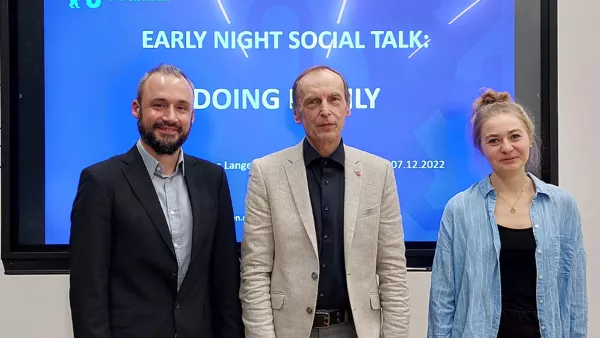
Nowadays, parenthood no longer necessarily means living in a couple relationship and sharing a household. Nowadays, a family decides for itself who belongs to the family and how the tasks are distributed. But how does "family" work? Who raises the children? Who does the laundry? Who remembers birthdays and organizes family celebrations? In the kick-off event of the Early Night Social Talk on December 7th, 2022, Professor Dr. Andreas Lange gave a glimpse into family life and explained how this "Doing Family" works.
Where does the time go?
At the beginning of the talk, Andreas Lange explained the areas of tension in which families find themselves today. Parents are often under great pressure and lacking time. "Half of the adults consider the time they spend on household chores to be insufficient," the sociologist quoted a time-use study. Likewise, more than half of parents complain that the time they have for their children is too little. "Even children know: I want to spend quality time with dad," explained Andreas Lange. Although average working hours per person have decreased compared to the pre-industrial era, on the other hand, women's employment is increasing the total amount of time spend at work within a family. The combined workload of caring and working particularly affects mothers, he said. "A mother with young children is busy with work and care work for about fourteen hours a day," Andreas Lange explained. "There is a great perceived and objective time crunch." At the same time, he said, this kind of work gets little recognition in society.
"You do too little"
Family life is not only oriented around parents' working hours; the education system also has an influence on it. "In a society of education panic, everyday family life is geared to the specifications of daycare and schools," said Andreas Lange. When it comes to education, politicians are increasingly putting parents in the crosshairs. According to the 2001 PISA study, the starting point for all educational processes is the family. Andreas Lange sums up this educational offensive, which is already taking off within the family's own four walls: "The time of idleness for young children is over. They're no longer just being looked after, they're learning, experimenting, learning English." Parents are increasingly expected to act as educational coaches . "Many a little drama takes place when schoolwork is done at home." According to measurements, mothers' cortisol levels skyrocket enormously when supervising homework. And nevertheless it resounds "you do too little" from politicians.
Hannah-Marie Fey supplemented Andreas Langes' presentation with the results of her master's thesis on "Doing Family". At the end of 2021, she researched the situation of families in the Ravensburg area in cooperation with the Ravensburg District Office. During the Corona pandemic, she was able to identify another factor that had a significant impact on family life: childcare during the pandemic. Around 30 percent of respondents said they found this "very stressful." About another third found child care "somewhat stressful."
Doing Family in 2035
"Doing Family", it's not so easy, is it? Nevertheless, Andreas Lange is optimistic. Family will become smarter, more digitalized and more pluralistic. There will be more family-compatible working conditions and friendships will play a key role in managing family tasks. Families will also change as society ages. "Grandchildren have never seen their grandparents last so long," Andreas Lange said. "Families can look quite positively into the future after all; there will be some changes and many things will improve."
The entire presentation is available online at: Early Night Social Talk - YouTube